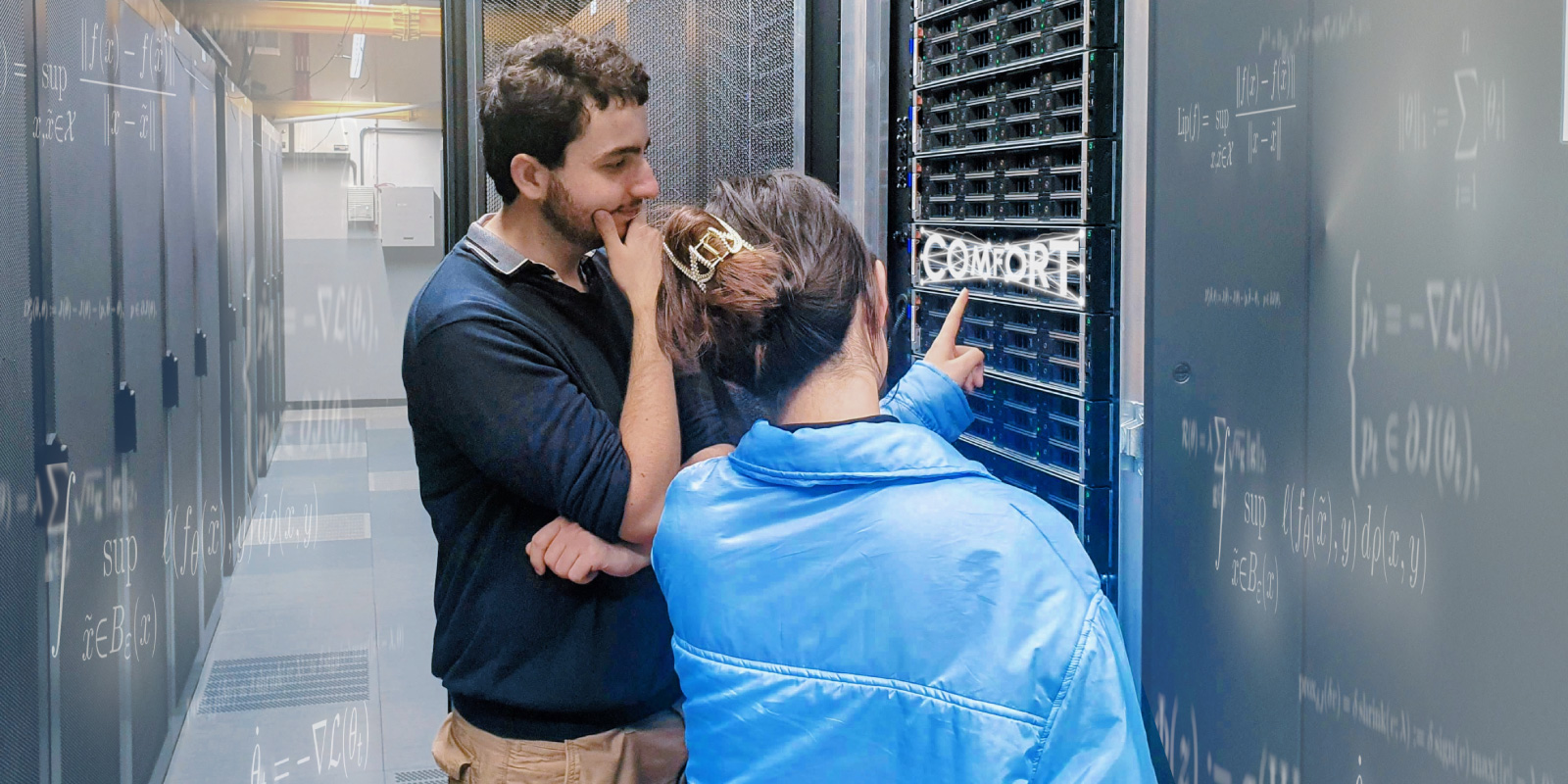Published on 21.11.2024
Driving Sustainable AI: BMBF Funding for the Helmholtz Association & its Data Science Platforms for Machine Learning Innovation

Six projects that are led or co-led by researchers from the Helmholtz Association have secured funding from the Federal Ministry of Education and Research (BMBF). The goal of the €30 million investment in 15 cutting-edge projects in AI and ML is to advance machine learning’s flexibility, resilience, and efficiency, and thus to develop sustainable, high-impact AI solutions, through the development of innovative and new machine learning approaches.
The (co-)leaders of the projects are affiliated with the Helmholtz Association, Helmholtz Imaging and Helmholtz AI, two of the five Helmholtz Information and Data Science Platforms established by the Helmholtz Association since 2018. These platforms foster a vibrant network that continuously develops innovative solutions to address the challenges of cutting-edge research in information and data science. The success of these funded projects emphasizes the Association’s and platforms’ roles in fostering collaborative, interdisciplinary research, and thus driving impactful advancements across the different research fields.
Overview of All Helmholtz-affiliated Projects
CausalNet – Nadja Klein (KIT, Helmholtz AI Associate), Stefan Bauer (Helmholtz AI Lab PI), Niki Kilbertus (Helmholtz AI Lab PI)
COMFORT – Martin Burger (DESY, Helmholtz Imaging)
FAIME – Stefan Kesselheim (FZJ, Helmholtz AI Consultant Head, HFMI Synergy Unit)
KI-HopE-De – Ralf Loritz (KIT, Helmholtz AI Associate)
OPENHAFM – Jenia Jitzev (FZJ)
RAINA – Martin Schulz (FZJ, HFMI)
Find full project descriptions here (German only).
Project with Helmholtz Imaging Lead

COMFORT: Compression methods for robustness and transfer
- Lead Helmholtz PI: Martin Burger (DESY, Helmholtz Imaging)
- Co-Helmholtz PI: Tim Roith (DESY, Helmholtz Imaging)
- Partners: Universität Würzburg, Deutsches Elektronen-Synchrotron, Technische Universität München, Universität Hamburg und Friedrich-Alexander-Universität Erlangen-Nürnberg
- Timeframe: October 2024 – September 2027.
- Objective: Design novel compression techniques to optimize the performance, robustness, and efficiency of ML models, with applications in imaging and industrial processes.

“COMFORT aims to develop mathematically grounded methods for efficient and robust learning and to examine the interfaces between these areas. The goal is, on the one hand, to make the use of neural networks more reliable through theoretical guarantees and, on the other hand, to significantly improve the CO₂ footprint of training and evaluation through model compression,” explains Tim Roith, postdoctoral researcher with Helmholtz Imaging at DESY. “The flexible applicability of the algorithms developed within COMFORT is ensured by a wide range of use cases. Here, DESY, with its state-of-the-art facilities, plays an important role as a key representative for imaging techniques”.
Tim will participate in the project with Martin Burger, Helmholtz Imaging Head of Research Unit at DESY. Together with his team, Martin is developing robust and efficient algorithms to solve inverse problems for the various imaging modalities within the Helmholtz Association.
This project, alongside the projects with Helmholtz AI leads listed below, addresses the growing demands on AI systems by enhancing both functionality and energy efficiency. In collaboration with project partners, Helmholtz Imaging and Helmholtz AI aim to drive sustainable and practical machine learning innovations.
Projects with Helmholtz AI Lead
CausalNet: A framework for integrating causality for flexible, robust and efficient machine-learning models
- Lead Helmholtz PIs: Nadja Klein (KIT, Helmholtz AI Associate), Stefan Bauer (Helmholtz AI Lab PI), Niki Kilbertus (Helmholtz AI Lab PI)
- Partners: Karlsruhe Institute of Technology (KIT), Helmholtz Zentrum München (HMGU), Ludwig-Maximilians-Universität München.
- Timeframe: October 2024 – September 2027.
- Objective: Develop a causal ML framework to improve model robustness and performance by integrating causal reasoning into ML architectures. The project will create open-source causal tools, benchmarks, and datasets applicable across healthcare, bioinformatics, and public services.
Read more about this project in the press release “New Collaborative Project: Artificial Intelligence That Recognizes Causal Relationships” by Helmholtz Munich.
FAIME: Flexible, efficient AI-driven molecular simulation
- Lead Helmholtz PI: Stefan Kesselheim (FZJ, Helmholtz AI Consultant Head, HFMI Synergy Unit)
- Partners: Forschungszentrum Jülich, Freie Universität Berlin.
- Timeframe: October 2024 – September 2027.
- Objective: Accelerate molecular simulations to study protein dynamics critical for understanding diseases like Alzheimer’s. The project will use graph neural networks and physical theories to create open-source tools applicable to medicine and materials science.
Read more about this project in the press release “Electricity Consumption and Reliability – AI in Application” by Forschungszentrum Jülich (German only).
KI-HopE-De: AI-based flood forecasting for small catchment areas in Germany
- Lead Helmholtz PI: Ralf Loritz (KIT, Helmholtz AI Associate)
- Partners: German Weather Service, State Offices for Nature and Environment (North Rhine-Westphalia and Rhineland-Palatinate)
- Timeframe: December 2024 – November 2027.
- Objective: Enhance flood forecasting in small river catchments using AI, improving accuracy and lead time. The project will develop a prototype platform for nationwide adoption to bolster public safety.
Read more about the projects CausalNet,FAIME and KI-HopE-DE in the release by Helmholtz AI.
Other Helmholtz-affiliated Projects
OPENHAFM: Evaluating and improving open foundation models through systematic human alignment benchmarking and dataset curation
- Lead Helmholtz PI: Jenia Jitsev (FZJ)
- Partners: Max Planck Institute for Intelligent Systems, University of Tübingen, Forschungszentrum Jülich.
- Timeframe: October 2024 – September 2027.
- Objective: Improve foundation models, like ChatGPT, by aligning them with human judgment and logical reasoning. The project will curate benchmarks and datasets to ensure reliable performance in critical applications.
RAINA: A statistically robust AI foundation model of the atmosphere for better short-term predictions of extreme events
- Lead Helmholtz PI: Martin Schulz (FZJ, HFMI)
- Partners: European Centre for Medium-Term Weather Forecasts, University of Bonn, German Weather Service.
- Timeframe: November 2024 – October 2027.
- Objective: Develop the first AI foundation model of the atmosphere to enhance short-term extreme weather forecasts with unprecedented resolution and accuracy, addressing societal and climate challenges.
Links
BMBF funding line “Flexible, resilient and efficient machine learning models”
Helmholtz Association
Helmholtz Information and Data Science Platforms
Helmholtz AI